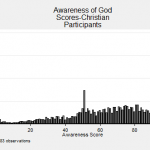Part 4 in a series on deconversion.
Going into this study of deconversion, I figured that interactions and relationships with non-Christians would be an important cause for people leaving. After, we’re sociologists, and we study how peer and friend relationships affect so many things.
However, in the narratives themselves, there were surprisingly few references to non-Christians leading the writers away from faith. We counted only eight in the fifty testimonies that we read. For example, one writer had a non-Christian friend loan him a book arguing against Christianity. Another had a family member who advocated against Christianity.
Far more commonly, non-Christians were mentioned as supporting the writers’ decisions after they had left Christianity. For example, the website from which we drew the narratives endorsed and supported the decisions of former Christians, but it did not seem to initially bring about these decisions.
As such, the narrative writers rarely described individuals outside of the church as helping bring about their deconversion. Rather, they described new relationships with non-Christians (exemplified by their participation in an online community for deconverts) as the consequence, not cause, of changes in their beliefs.
Why might non-Christians be mostly absent from these deconversion stories? One answer might be the insular social networks of some Christians, for several writers spoke of having had relatively few interactions or relationships with non-Christians. For example, a woman raised in the church wrote that she did not even know what the word “atheist” meant until she was in her twenties.
 Generally speaking, then, the data that we analyzed focused on “push” factors away from Christianity rather than “pull” factors. The deconverts spoke of leaving the faith because of concerns with theology and God rather than being drawn away by friendships with non-Christians or by sin.
Generally speaking, then, the data that we analyzed focused on “push” factors away from Christianity rather than “pull” factors. The deconverts spoke of leaving the faith because of concerns with theology and God rather than being drawn away by friendships with non-Christians or by sin.
Granted, these data have their weaknesses, as discussed in the first post of the series. For example, maybe the testimony writers wanted to justify their decisions on what they viewed as moral grounds rather than immoral (e.g., sex, drugs).
However, if in fact “push” factors outweigh “pull” factors in the deconversion process, then perhaps Christians should be less concerned about staying away from non-Christians and secular culture. In fact, work by Christian Smith and others suggests that engaging with people who believe differently than us can actually bring our beliefs to the foreground and thus strengthen them.
There are still two more posts in this series, but I want to recognize my coauthors: Mark Edwards, of Oregon State University, Emily Dolan, of the University of Connecticut, and Dina Dina Giovanelli, of the Monroe Community College.
The material in this series so far was originally part of a scholarly article published in the Journal of Religion and Society. You can read it here.
















